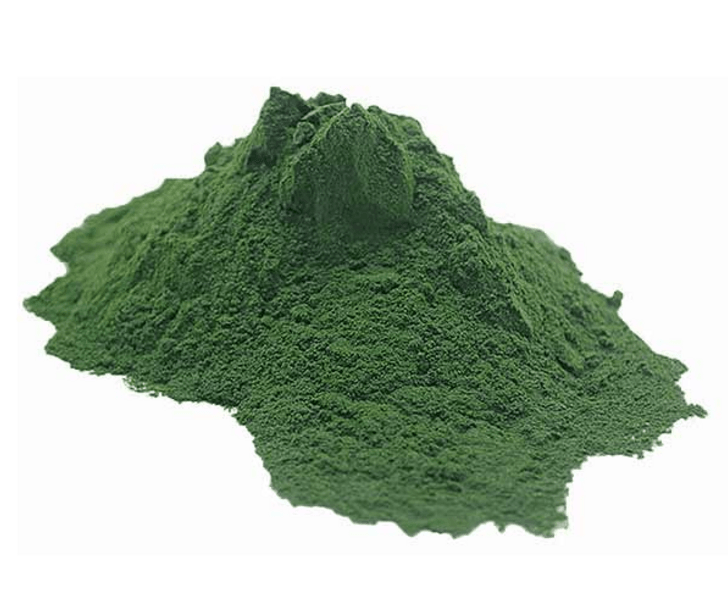Spirulina (Blue-Green Algae)
Ancient peoples were drawn to the striking blue-green color of what they believed to be a plant growing on the surface of salt and fresh water lakes. The richly hued vegetation turned out to be nutrient-rich and it supplied a good source of protein, vitamins and minerals that sustained these people for centuries. Today, scientists understand Spirulina — as blue-green algae are known in the lab — to be bacteria, not algae, and to be a potential source of nutritional supplementation.
English name: Blue-green algae
Latin name: Spirulina or Arthrospira
Type: Cyanobacterium
What Is Spirulina?
The name spirulina derives from the helical or spiral shape of the organism’s filaments. The filaments weave into an alga that thrives in both fresh and salt water lakes all over the world. The process of photosynthesis gives it a bright blue-green color that can make a lake’s water appear more jewel-toned than it is1. Spirulina contains high levels of protein, iron and B vitamins that have made it a popular ingredient in dietary supplements in the U.S. since the 1970s2. It has a very mild taste and is considered generally safe for consumption by the U.S. Food and Drug Administration4. Many manufacturers use spirulina as a coloring additive in gum, candy and other packaged foods2.
How Does Spirulina Work?
The high levels of important nutrients like protein, iron and B vitamins in spirulina mean it can be a healthy addition to any diet3. Additionally, studies have shown that its nutrient-rich character contributes to supporting the immune system and alleviating inflammation – the cause of many ailments. Specifically, spirulina helps inhibit the release of histamines from mast cells, meaning it can help alleviate a variety of seasonal and other allergy symptoms4.
What Are the Benefits of Spirulina?
The FDA has noted that spirulina contains high amounts of nutrients that can be difficult to get enough of from food, like niacin, potassium, magnesium and iron. People at risk of malnutrition or anemia could benefit from adding spirulina to their regimen in order to ensure they are consuming enough of these nutrients2.
The anti-inflammatory properties of spirulina make it particularly effective at controlling seasonal allergy symptoms. The abundance of anti-oxidant components in spirulina may help combat cell and DNA damage that can contribute to conditions like heart disease, high cholesterol, muscle fatigue from exercise and other chronic inflammation-driven problems4. When combined with zinc, spirulina is very effective at treating arsenic poisoning from contaminated water sources. Though more research is needed, spirulina may alleviate symptoms associated with general fatigue, menopausal depression, wound healing and low metabolism2.
Spirulina may slow the clotting of blood, so caution is necessary if combining it with blood thinners or other medications, and pregnant women may want to avoid it, as there is simply not enough information about how it may affect the fetus2.
Products featuring Spirulina:
Skin and Coat Tonic™ for Shiny & Glossy Fur
Muscle & Joint Support-S™ for Pet Strength & Mobility

Practice Self Care
Native Remedies recommends you consult your doctor before introducing new herbal products into your regimen. Always ensure you are buying high-quality, laboratory-tested supplements from a reputable supplier. At Native Remedies, we back all our products with a 100 percent money-back guarantee. If you’re not happy with your purchase after trying it for 30 days, simply send it back for a refund. Here’s to your good health!
The content provided is for informational purposes only. It is not a substitute for professional medical advice. If you have a health condition, please consult a medical professional and do not use this information to self-diagnose or self-treat.
References:
1. "Blue-Green Algae: MedlinePlus Supplements." MedlinePlus. November 1, 2017. Accessed August 12, 2018. https://medlineplus.gov/druginfo/natural/923.html.2. Cox, Lauren. "Spirulina: Nutrition Facts & Health Benefits." LiveScience. February 06, 2018. Accessed August 12, 2018. https://www.livescience.com/48853-spirulina-supplement-facts.html.3. "Food Composition Databases Show Foods -- Seaweed, Spirulina, Dried." Food Composition Databases Show Foods -- Oil, Soybean, Salad or Cooking. Accessed August 12, 2018. 4. Karkos, P. D., S. C. Leong, C. D. Karkos, N. Sivaji, and D. A. Assimakopoulos. "Spirulina in Clinical Practice: Evidence-Based Human Applications." Advances in Pediatrics. October 19, 2010. Accessed August 12, 2018. https://www.ncbi.nlm.nih.gov/pmc/articles/PMC3136577/.
Reviewed by Master Herbalist, Mary Ellen Kosanke